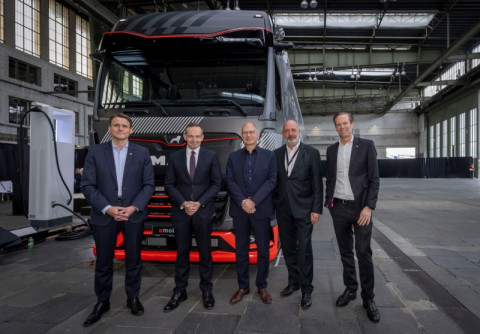MAN, ABB E-mobility ready with 'megawatt charging' in long-haul trucking
MAN Truck & Bus and ABB E-mobility are revving up for the next phase of electromobility, with operational capability for heavy-duty long-haul trucking with daily ranges between 600 and 800 kilometres. With their unequivocal commitment to e-mobility, the companies claim that the trucking segment is ready, and that legislators must establish the policy framework for zero-emission road haulage.
A special technical feature of the new electric commercial vehicle that MAN plans to launch in 2024 is 'megawatt charging'. This enables long-distance daily driving range between 600 and 800 kms for the truck, according to the company. ABB E-mobility, a leading global provider of charging solutions for EVs, aims to bring megawatt charging technology to market maturity in the next three years.
Alexander Vlaskamp, CEO of MAN Truck & Bus, emphasized that "accelerating the expansion of the charging infrastructure is the only way to achieve the evolution of transport and meet climate targets." He also highlighted why MAN is relying on battery-electric powertrains for future carbon-free commercial vehicle fleets - low operating costs and the best overall energy footprint.
"As part of the Traton Group, we are already participating in a joint venture with industry partners to develop and operate a high-performance public charging network with a target of at least 1,700 green electricity charging points across Europe," Vlaskamp added.
"At ABB E-mobility we have been working on developing the corresponding performance standards for many years. Megawatt charging will require new power technology with more than 1,000 volts, so systemic electrical safety and reliability are essential at these power levels and for the foreseeable use cases," said Frank Mühlon, CEO of ABB E-mobility.
ABB E-mobility is the ideal provider to take on these challenges, as we can significantly accelerate research and development based on our existing technologies, he added. "Our shared ambition is to bring this new technology to market within three years. In the past, such development phases have often taken much longer".
A binding and uniform standard is also crucial for the introduction of megawatt charging technology. Germany could set benchmarks in this regard, as more than 20 partners from industry and science, including MAN and ABB, are working on the high-performance charging project (known as "HoLa" in German), which is funded by the German government and is the world's first megawatt charging project.
Two high-performance charging points with megawatt charging systems (MCS) are being built at four locations along the A2 federal highway. The project is intended to serve as the basis for nationwide expansion, according to reports.





















